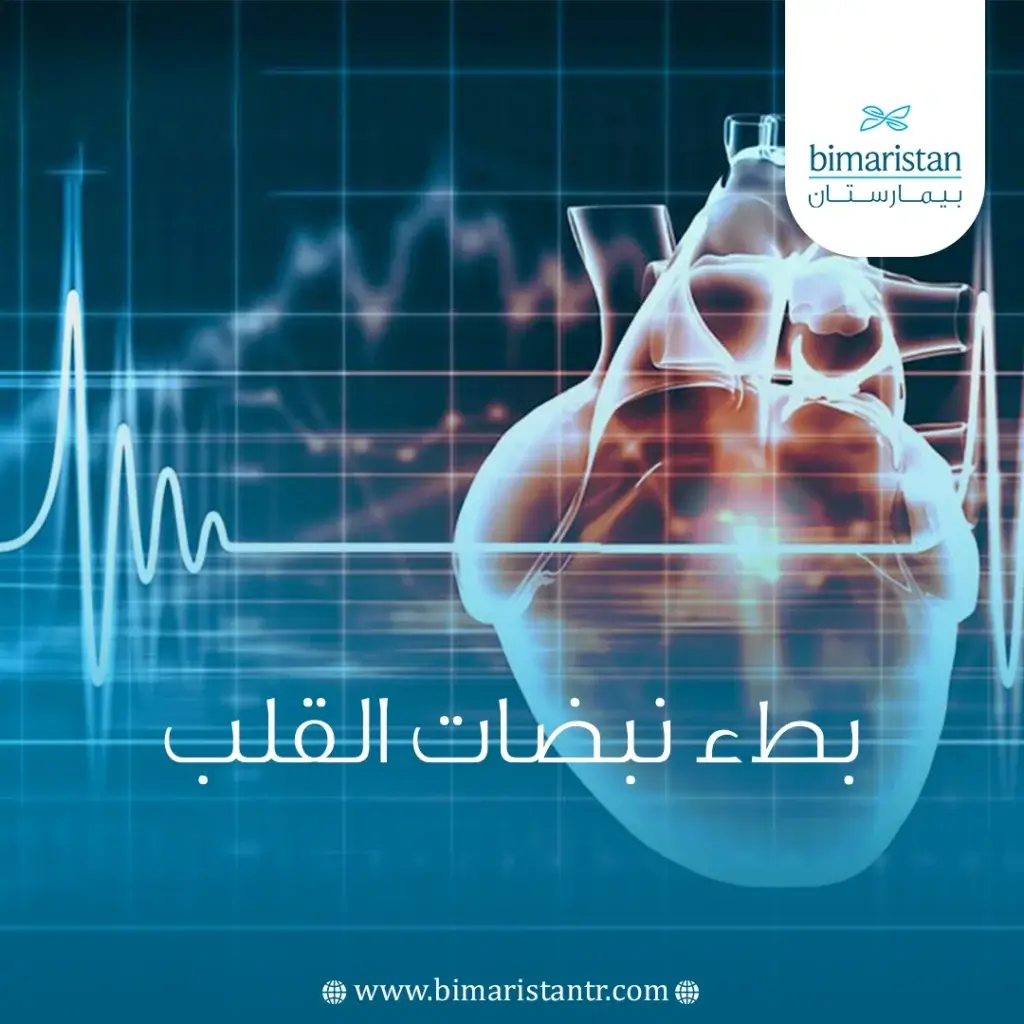بطء نبضات القلب هو انخفاض شديد في معدل دقات القلب، معدل ضربات القلب الطبيعي عند البالغ 60-100 نبضة في الدقيقة، قد يسبب بطء القلب أعراضاً تستدعي العلاج في تركيا.
بطء نبضات القلب
تعد عضلة القلب مسؤولة عن ضخ الدم المحمل بالأكسجين في جميع أنحاء الجسم عن طريق ما يسمى “الدورة الدموية”، عندما لا يعمل القلب كما يجب ويصبح معدّل دقات القلب أقل من 60 دقّة في الدقيقة أثناء الراحة تحدث حالة تسمى “تباطؤ ضربات القلب bradycardia”.
قد يكون بطء القلب فزيولوجياً عند بعض الأشخاص؛ حيث يصل معدل ضربات قلب الإنسان إلى 40 نبضة في الدقيقة عند الراحة طبيعياً لدى بعض الرياضيين الذين لديهم لياقة جيدة، كما قد ينخفض معدل ضربات القلب إلى أقل من 60 نبضة في الدقيقة خلال النوم العميق.
على الجانب الآخر قد يشير بطء ضربات القلب إلى خطورة على حياة الإنسان إذا لم يستطع القلب تأمين كمية كافية من الدم المحمل بالأكسجين إلى كافة أنحاء الجسم، عندها تحدث أعراض مثل الدوار والتعب وضيق التنفس.
كيف يحافظ القلب على انتظام ضرباته؟
يتكون قلب الإنسان من أربع حجرات؛ حجرتان علويتان (أُذَيْنَتان) وحجرتان سفليتان (بُطَيْنان).
يوجد على جدار الأذينة اليمنى مجموعة من الخلايا تشكل عقدة تسمى “العقدة الجيبية الأذينية” مسؤولة عن توليد إشارات كهربائية بشكل منتظم.
تنتقل هذه الإشارات الكهربائية عبر جدار الأذينتين مما يؤدي إلى تقلصهما ودفع الدم باتجاه البطينين، ثم تنتقل الإشارة إلى عقدة أخرى موجودة في مركز القلب تسمى “العقدة الأذينية البطينية”.
تؤدّي العقدة الأذينية البطينية دور البوابة التي توقف الإشارة لأجزاء من الثانية قبل السماح لها بالانتقال إلى حزمة هيس وألياف بوركنجي التي تنقلها إلى جدار البطينين فيتقلصان، وبهذا تكتمل النبضة القلبية.
تقوم العقدة الجيبيّة الأذينية بمهمة تنظيم سرعة خفقان القلب عبر التحكم بسرعة إصدار الاشارات الكهربائيّة لذلك تعد هذه العقدة هي المنظم الطبيعي لضربات القلب عند الإنسان.

أسباب بطء نبضات القلب
هنالك الكثير من الأسباب والحالات التي قد تؤدي إلى انخفاض شديد في معدل ضربات القلب وحدوث بطء القلب bradycardia، يزداد شيوع هذه الحالة مع التقدم بالعمر كمعظم الأمراض القلبية الأخرى بسبب تأذي الأنسجة القلبية، تتضمن أسباب بطء ضربات القلب:
- مشاكل في العقدة الجيبية الأذينية كمتلازمة العقدة المريضة
- مشاكل في العقدة الأذينية البطينية أو في الطرق الناقلة للإشارة الكهربائيّة
- عيوب القلب الولادية
- مشاكل استقلابية كقصور الغدة الدرقية
- أذية القلب الناتجة عن مرض قلبي أو أزمة قلبية
- التهاب القلب والحمى الرثوية والذئبة الحمامية الجهازية
- عملية جراحية سابقة على القلب
- اضطراب أحد شوارد الدم كالبوتاسيوم أو الكالسيوم
- متلازمة انقطاع النَّفَس أثناء النّوم
- بعض الأدوية مثل المهدئات والأفيونات والأدوية المستخدمة في علاج ارتفاع ضغط الدم وعلاج اضطراب النظم القلبي
أسباب تباطؤ ضربات القلب عديدة ومتنوعة، سيقوم مركز بيمارستان الطبي في تركيا بإجراء تشخيص دقيق ومعرفة سبب تباطؤ ضربات القلب لاختيار العلاج الأمثل لكل حالة في أحدث المشافي وعلى يد أمهر الأطباء في تركيا.
أعراض بطء نبضات القلب
إن انخفاض معدل ضربات القلب عند البالغين إلى أقل من 60 نبضة في الدقيقة يؤدي إلى عدم وصول الدم الكافي إلى الدماغ وباقي أعضاء وأنسجة الجسم مما يحرمها من الأكسجين اللازم لأداء وظيفتها الطبيعية على أكمل وجه وقد تظهر الأعراض والعلامات التالية:
- دوار
- ضعف وتعب
- تخليط ذهني
- إغماء
- زلة تنفسية أو ضيق نفس
- ألم صدري
- صعوبة في ممارسة الرياضة
- توقف القلب (في الحالات الشديدة)
في حال انخفاض عدد دقات قلبك إلى أقل من 60 دقة في الدقيقة ولم تشعر بأي من الأعراض السابقة فلا داعي للهلع، لكن كن حذراً! إذا ظهرت لديك أي من اعراض بطئ ضربات القلب تواصل معنا مباشرة.
تشخيص بطء نبضات القلب
بعد الاستماع إلى شكايتك سيقوم الطبيب في تركيا بفحصك سريرياً وسماع دقات قلبك بالسماعة الطبية لتحديد معدل ضربات القلب وقياس ضغط الدم خلال الراحة.
كما قد يطلب منك القيام ببعض الفحوصات والتحاليل لمحاولة تحديد سبب بطء ضربات القلب والحصول على مزيد من المعلومات حول إيقاع القلب ومعدل دقاته، من هذه الاختبارات:
- تخطيط القلب الكهربائي (ECG أو EKG): وهو أهم اختبار تشخيصي لبطء ضربات القلب، إذ يقيس الفعاليّة الكهربائيّة للقلب، قد يكون معدل ضربات القلب طبيعياً عند إجراء تخطيط القلب في عيادة الطبيب على الرغم من ظهور الأعراض عليك، عند حدوث ذلك سيقوم طبيبك بإعطائك جهازاً لمراقبة تخطيط القلب الكهربائي خلال 24 ساعة يدعى مرقاب هوتلر.

صورة توضح الفرق بين التخطيط الكهربائي الطبيعي والتخطيط في بطء نبضات القلب الجيبي - التحاليل الدموية: كتعداد الدم الكامل وقياس مستوى السكر والشوارد والهرمونات الدّرقية في الدم.
- إيكو القلب: والذي يعطي صوراً لشكل القلب فيكشف إذا كان لديك عيوب قلب ولادية.
- دراسة النوم: عند الشك بحدوث انقطاع نَفَس خلال النوم.
اعتماداً على نتائج الفحوصات السابقة قد يقوم الطبيب في تركيا بإجراء مزيد من الاختبارات بهدف تشخيص انخفاض معدل ضربات القلب وتحديد السبب الدقيق لحدوثه لاختيار العلاج النهائي الأمثل لكل حالة.
علاج بطء نبضات القلب
يعتمد علاج بطء ضربات القلب في تركيا بشكل أساسي على ظهور الأعراض، فأحيانا لا يكون المريض بحاجة إلى علاج وأحيانا يسبب بطء القلب مضاعفات خطيرة تهدد الحياة.
قد يكون علاج بطء نبضات القلب مرهوناً بعلاج السبب الذي أدى إلى حدوثه كعلاج نقص هرمون الدرق أو علاج المرض المستبطن في القلب أو تصحيح الشوارد، وقد يضطر الطبيب إلى علاج بطئ ضربات القلب بحد ذاته بواسطة الأدوية أو عبر تركيب بطارية القلب.
علاج ضربات القلب البطيئة في المنزل
يعتبر علاج دقات القلب البطيئة باستخدام الأدوية ممكناً إلا أن ذلك قد يتسبب بالعديد من الآثار الجانية على المدى الطويل، وهذا غالبًا ما يحدث عندما يتسبب بطء القلب بأعراض حادة إضافة إلى عدم وجود سبب واضح لانخفاض معدل النبض يمكن معاكسته.
وفيما يلي أدوية لعلاج بطء دقات القلب والمحافظة على انتظام سرعة النبض القلبي الطبيعي يمكن إعطاؤها وريدياً في حالة بطء القلب الإسعافي:
- الأتروبين (والذي يعد الخط الأول في العلاج)
- الدوبامين
- الإبينفرين
- الغليكوبيرولات
كما يمكن في بعض الأحيان علاج بطء نبضات القلب بالاعشاب كعشبة الزعرور بخصائصها المميزة التي تساعد في الحفاظ على انتظام معدل ضربات القلب، إضافة إلى الاطعمة النباتية خاصة تلك الغنية بالمعادن كالمغنيزيوم والبوتاسيوم والفيتامينات كفيتامين C الموجود في الفلفل الحار الذي يعتبر منشط طبيعي لقلب الإنسان.
بطارية القلب
إذا كان بطء القلب شديداً ولم تنفع الطرق الأخرى في علاج تباطؤ ضربات القلب فقد تكون مؤهلاً لإجراء عملية تركيب بطارية القلب في تركيا.
بطاريات القلب هي أجهزة تستخدم من أجل تنظيم ضربات القلب عبر إرسال إشارات كهربائية إلى القلب يتم زراعتها عادة في الصدر تحت الجلد.
يحتوي جهاز تنظيم ضربات القلب على بطارية ودارة كهربائية ضمن علبة معدنية صغيرة بالإضافة إلى أسلاك يتم توجيهها عبر الأوردة إلى داخل حجرات القلب، يقوم هذا الجهاز بمراقبة دقات القلب باستمرار ويرسل إشارات كهربائية تسرع ضربات القلب كلما أصبحت دقات القلب بطيئة.

ويمكن في الوقت الحالي بعد تطور العلاج في تركيا تركيب بطارية قلب لاسلكية تقوم بإرسال الاشارات الكهربائيّة إلى القلب دون الحاجة إلى الأسلاك، وقد ثبتت فعاليتها في علاج انخفاض معدل ضربات القلب.

